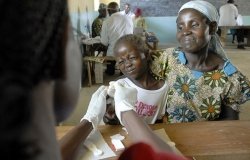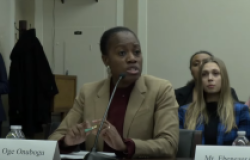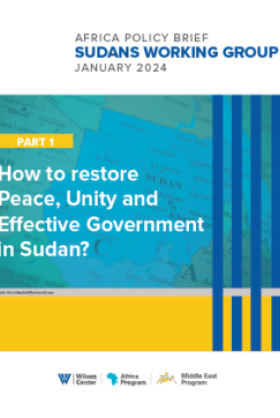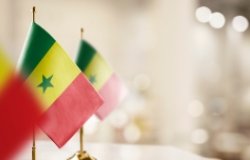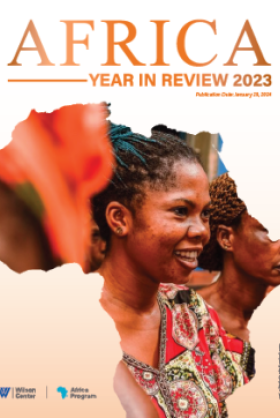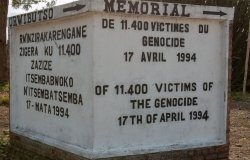Burundi: The Challenges and Opportunities that Lie Ahead<br>An Address by President Pierre Nkurunziza
Overview
 On Wednesday February 6, 2008, the Wilson Center hosted a presentation by H.E Pierre Nkurunziza, President of the Republic of Burundi. The event and the discussion that followed were moderated by Howard Wolpe, the director of the Wilson Center's Africa Program.
On Wednesday February 6, 2008, the Wilson Center hosted a presentation by H.E Pierre Nkurunziza, President of the Republic of Burundi. The event and the discussion that followed were moderated by Howard Wolpe, the director of the Wilson Center's Africa Program.
Ambassador Wolpe introduced President Pierre Nkurunziza and commented on the remarkable progress that Burundi has made since 1995. He said that in addition to a significant lessening of the ethnic dimension of the conflict in Burundi, various social programs such as universal education for primary school children and free pre- and post-natal health care for women and young children had been created. The army and the police have been successfully integrated and the new command structures are working well together. President Pierre Nkurunziza has been able to negotiate a power sharing agreement with members of the opposition which has resulted in a more cohesive cabinet and unblocking of parliamentary procedures. Despite all these improvements, Burundi is still a fragile state, government faces a leadership challenge and many core development issues remain unaddressed. Progress is also overshadowed by continuing conflict in the DRC which could affect the whole region if not brought under control.
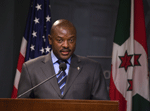 In his prepared remarks, President Nkurunziza discussed Burundi's challenges as well as opportunities. He explained that because Burundi is coming out of many years of conflict, many obstacles face it and much effort will be required to overcome them. Amongst the problems he mentioned were issues relating to poverty, access to education and clean water, disarmament of civilians, malaria, HIV/AIDS and population explosion. President Nkurunziza also focused on recent positive events such as the elimination of health care fees for pregnant mothers and children under 5 years of age, the building of primary schools by both the government and local communities and the creation of health centers. In addition, there are many advantages that Burundi has such as its hard working population, a successful peaceful democratic process and fertile land. The country also has important tourist, mineral and hydro electric potential. President Nkurunziza added that in a few months, discussions on ways to set up the truth and reconciliation commission would begin, thus giving Burundi an opportunity to succeed in its ongoing peace process. He concluded by reminding the audience that in order to fully benefit from all this potential Burundi needs the support of the international community.
In his prepared remarks, President Nkurunziza discussed Burundi's challenges as well as opportunities. He explained that because Burundi is coming out of many years of conflict, many obstacles face it and much effort will be required to overcome them. Amongst the problems he mentioned were issues relating to poverty, access to education and clean water, disarmament of civilians, malaria, HIV/AIDS and population explosion. President Nkurunziza also focused on recent positive events such as the elimination of health care fees for pregnant mothers and children under 5 years of age, the building of primary schools by both the government and local communities and the creation of health centers. In addition, there are many advantages that Burundi has such as its hard working population, a successful peaceful democratic process and fertile land. The country also has important tourist, mineral and hydro electric potential. President Nkurunziza added that in a few months, discussions on ways to set up the truth and reconciliation commission would begin, thus giving Burundi an opportunity to succeed in its ongoing peace process. He concluded by reminding the audience that in order to fully benefit from all this potential Burundi needs the support of the international community.
Ambassador Wolpe then opened up the discussion to questions from the audience. Many of the questions focused on Burundi's ability to maintain peace through the elections in 2010 and its potential contribution to peace in the region, particularly in the DRC.
In his response, President Nkurunziza said that because of its peaceful track record, Burundi has inspired trust in the region. The peace in Burundi is a lesson for the DRC. He described the various factors which contributed to Burundi's successful peace process. One is the fact that Burundi had reached war fatigue. No matter their political leanings, every one was ready to bring the conflict to an end. Another factor was poverty. All those who were fighting had become too poor to continue on the same path. Some army officers were responsible for up to 20 orphans and the situation was the same on the rebels' side. According to President Nkurunziza, "there were no other options but to choose peace as a solution as conditions of life were becoming more and more difficult." He added that no one believed Burundi would ultimately have peace and it was the complex and difficult nature of the conflict that lead to this opinion. Part of the success of the peace process can be attributed to the training of a new army and police force, which despite being made up of new and old officers, is able to collaborate effectively. Burundi even sends troops to help other countries such as Ivory Coast and Sudan. This proves how much Burundi is willing to reciprocate the actions carried out by other countries to help them. The upcoming creation of the truth and reconciliation commission will further solidify the country's peace process. Furthermore, Burundi has entered an agreement with Rwanda, the DRC and Uganda whereby they meet on a monthly basis to discuss ways of creating and maintaining peace in the region. This has changed the relationship between these countries and has led to more collaboration on security issues especially in the DRC.
With respect to the upcoming 2010 elections, President Nkurunziza was confident that they would run as smoothly as the 2005 elections. When asked if he was preparing for the possibility of a situation similar to the recent post-election violence in Kenya, he reminded the audience that Kenya's issues were not the same as Burundi's. In fact, Burundi's situation was far more difficult than that of Kenya. Every African country is unique and what happens in one does not automatically dictate what happens in the next. He felt the Kenyan situation would be soon resolved and the international interventions were proving very helpful in reaching a positive outcome.
President Nkurunziza also touched on work that needed to be done before the 2010 elections particularly with regard to amendments to the constitution. He stated that all sides were already comfortable with the fact that certain articles needed to be reviewed, including the power of the executive to appoint diplomatic and military posts and Senate approval of that, and the percentages needed to pass laws in parliament. He added that, with the current collaboration between all political parties, it is most important to make these amendments to the constitution right now.
One audience member commented on Burundi's population explosion, high child and maternal mortality rates and asked what measures the government had in place to curb this phenomenon as well as meet the need for family planning.
President Nkurunziza responded that the problem resides within the mentality of the population. In Burundi, a family which has many children is considered to be blessed. But family planning policy has been in effect in Burundi for a while now and before the war these policies were quite successful. With the war and the despair it brought, the only thing everyone could do was have children. Many families were placed in displaced camps and were living under difficult conditions and that resulted in undesired pregnancies. Moreover, when someone lost two or three family members, they wanted to have other children to replace them. He added that family planning policies would now be launched again. Pregnant women already receive free health care which will help reduce maternal and child mortality rates that were some of the highest in the world. Before this, many women could not afford to give birth in hospitals and some subsequently died. Even when they went to hospitals, without financial means they were held prisoner.
Following up on gender issues, another audience member asked what was being done with regard to Burundian women's limited access to land.
President Nkurunziza described the problem of access to land as one that affects all Burundians and not just women. He explained that there were a multitude of problems: returning refugees and displaced persons often don't know what land was there's; many military don't know where they were born; land had often been sold since the original owners left, and some families illegally acquired land belonging to orphans. Once the truth and reconciliation commission presents its report, the government will take a close look at these issues. As for the law which gives women land rights, President Nkurunziza said that "it is one which has been initiated taking into account changing the mentality of the population on the issue." Eventually a solution will be found but one must move slowly and surely and not forget that there are families killing each other for land.
On a positive note, President Nkurunziza talked about Burundi's potential as a tourist attraction. He discussed the fact that the armed conflict and the absence of laws protecting the interests of investors had been major obstacles to the development of tourism. Recently, there have been efforts by the local population to develop the sector and there are many foreign investors looking to contribute to this by building five star hotels for example. The current level of security in Burundi will further attract investors but it is also important that Burundi is integrated into the East African Community. President Nkurunziza assured the audience that in 10 years, Burundi would have one of the best tourist sectors.
Ambassador Wolpe closed the discussion by stating that the international community often has the tendency to move on to the next crisis once there is peace in a country and the first elections have been held. Thus they forget that peace is actually a process. He hopes that President Nkurunziza's comments will encourage the international community to remain engaged in Burundi.
Drafted by Medesse R. Sonou, Intern and Mame Khady Diouf, Program Assistant, Africa Program.
Hosted By

Africa Program
The Africa Program works to address the most critical issues facing Africa and US-Africa relations, build mutually beneficial US-Africa relations, and enhance knowledge and understanding about Africa in the United States. The Program achieves its mission through in-depth research and analyses, public discussion, working groups, and briefings that bring together policymakers, practitioners, and subject matter experts to analyze and offer practical options for tackling key challenges in Africa and in US-Africa relations. Read more
Thank you for your interest in this event. Please send any feedback or questions to our Events staff.




